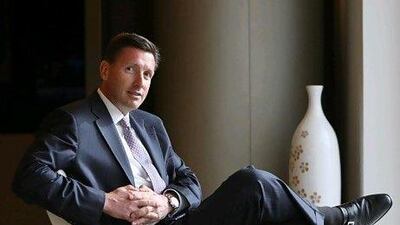As the chief executive of the Middle East and North African operations of HSBC, Simon Cooper is one of the biggest players in the regional banking business. He speaks of his vision for the region.
HSBC has been noticeably active in the recent spate of M&A [mergers and acquisitions] activity in the region. Why?
In May last year, we announced to investors that we were reviewing our businesses globally as it didn't necessarily make sense - for us or our investors - for HSBC to be everywhere.
Our strategy is very clear: we will invest where we see growth, and restructure or pull back where we do not. Our recent activity in Mena [the Middle East and North Africa] has shown both sides of this. We're reviewing our business in Pakistan as it doesn't have either the return or the potential for growth we look for.
On the other side, our planned acquisition of the onshore UAE assets of Lloyds shows we are ready to invest where we see growth. The merger of our Oman business with Oman International Bank is part of the same story. This is an attractive - and rare - chance for us to achieve immediate scale in a fast-growing, under-penetrated market.
Is the revival of regional capital markets an indicator that the negative effects of the Arab Spring were exaggerated?
It's important that we don't forget that the events of the Arab Spring were both swift and unprecedented. While the capital markets were the last thing on many people's minds, they were impacted as deals were put on hold and international investors opted to stay away.
However, the need for a functioning banking system didn't go away, and we worked hard to ensure that our branches remained open and that our local corporate customers could keep paying their suppliers and staff.
One of the lasting results of the events was to remind the world that the Middle East is not homogeneous. The international world woke up to the difference between Saudi and Egypt, for instance, and for some people that was entirely new.
So, the pickup happened at different times. The UAE was seen as a relatively safe haven and saw inflows of capital throughout. Then, in time, as the region responded to the concerns of their citizens, we actually saw a boost to regional markets as investment gathered pace and bond mandates came.
HSBC has been a firm ally of Dubai in the wake of the global financial crisis. What is the basis of the relationship?
We've been in the UAE for over 60 years and have become part of the fabric of the nation. We occupy what I feel is a unique position. To our regional customers here, we're a regional bank; but we're also one that can connect you to the rest of the world. As Dubai has developed, this international ability has become even more important.
UAE - and indeed regional - companies are looking at outside investment and opportunities, and this is where an international bank can help.
It's also about what we finance that's important: clearly, we offer retail accounts and products, but we also support a range of customers - from SMEs [small and medium enterprises] to builders of vital regional infrastructure. We are as positive about our future here as we are proud of our past.
Some commentators believe there is still a "legacy" from the crisis overhanging the UAE's banking system. What is your view of the overall financial health of the country's banks?
I can't speak for other banks, but we're in good health. Part of the reason for that is that we run a diversified business, so we're not beholden to one revenue stream or one country.
How does the Mena region fit in with HSBC's overall global strategy?
We're an emerging-markets bank, and Mena is a core part of our strategy. Mena is incredibly attractive to us, not just because of the hydrocarbon wealth in the region, but also because of the population demographics and financing opportunities present here.
However, I think one of the most important factors is how important global trade is to Mena, and at heart, we're a trade bank. We can help connect up our customers in Mena with international opportunities in a way no other bank can.
Will Dubai become a centre for the market in Chinese-currency-denominated financial instruments? How can HSBC assist?
I think the rise of the RMB [yuan renminbi] is unquestionable. It's really more about "when" it becomes a major settlement currency than "if".
We recently helped Emirates NBD launch the first Middle East RMB-denominated bond, and this was a major step for the region. Not only did it bring new Asian money to a Middle East company, but it also allowed a regional company to tell its story to Asian investors. There's a long history of trade between the two regions, and the importance of RMB led us to offer local business RMB accounts last year, so that they could deal with Chinese companies in their own currency.
Our prediction is very clear. UAE trade with China will overtake trade with USA by 2016, and businesses need to be ready for that.
twitter: Follow and share our breaking business news. Follow us

